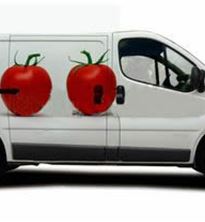
Tomatoes and auto: Ford and Heinz for the development of materials sustainable
Pubblished bykageja
Tomatoes and auto don't have very in common apparently, but the collaboration between Ford Motor Company and H.J. Heinz Company explores the possibility of this innovative advantage approach of the environment. The researchers of Ford and Heinz have developed a method to draw bio plastic from the fibbers of the tomato to increase the use of sustainable materials on board of the vehicles. In the specific one, the peels of the tomatoes desiccated could become stirrups of support of the cables of the plant electric or small vain storage.
"We are bringing forth the search to establish how much the by-products of the industrial procedures for the treatment of the food can find application in the world of the auto", Ellen Lee has explained, technical expert of search for the plastic subjects, of Ford. "Our objective is to develop a resistant but light material, that has an impact environmental meeting place and respects our standards of production."
The search has been brought before initially from Heinz, and subsequently proposed to Ford, to individualize innovative formality through which to recycle peels, stems and seeds of the 2 million of tons of tomatoes tried every year for the production of the ketchup.
Ford's appointment in to recycle, to reduce and material re-utilize is an element that drives the Blue oval in the development, all over the world, of new products that unite the energetic efficiency to an imprint environmental redoubt. In the years recent Ford has increased the use, on board of it own vehicles, of recycled materials or drawn by sustainable sources.
The materials of vegetable origin used by Ford today include the fibbers of cellulose, you use as I strengthen for the consoles of the cabins, the raw rice, used for the creation of stirrups in plastics, as well as the fibbers of coconut, cotton and soy, use for realizing fabrics.
source: www.megamodo.com

